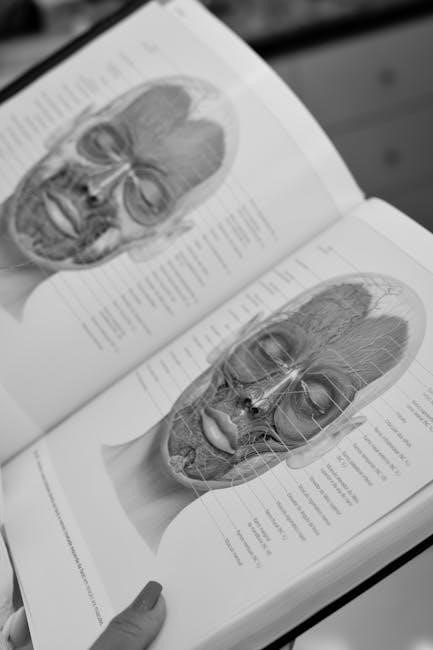
Pre-Calculus 12 is a foundational course that bridges algebra, geometry, and trigonometry, preparing students for advanced math studies; It covers essential topics like exponential functions, logarithms, and trigonometry, with resources like McGraw-Hill Ryerson’s textbook available in PDF format for comprehensive learning and problem-solving practice.
1.1 What is Pre-Calculus?
Pre-Calculus is a foundational mathematics course designed to prepare students for the study of calculus and other advanced mathematical disciplines. It serves as a bridge between basic algebra, geometry, and trigonometry, refining essential skills and introducing concepts that are critical for higher-level math. The curriculum typically includes topics such as exponential and logarithmic functions, polynomial and rational functions, trigonometry, sequences, series, and combinatorics. These areas are explored in depth to ensure students develop a strong understanding of mathematical relationships and problem-solving techniques.
Pre-Calculus emphasizes the practical application of mathematical concepts, often incorporating real-world scenarios to illustrate key principles. It also focuses on developing critical thinking and analytical skills, which are vital for success in STEM fields and beyond. The course is structured to build upon previously learned math concepts, ensuring a smooth transition into more complex studies like calculus. With its comprehensive approach, Pre-Calculus equips students with the tools and confidence needed to tackle advanced mathematical challenges effectively.
Resources such as the Pre-Calculus 12 textbook by McGraw-Hill Ryerson provide detailed explanations, practice problems, and solutions, making it easier for students to master the material. These textbooks are often available in PDF format, offering convenient access to course materials for self-study and review. By the end of the course, students are well-prepared to approach calculus and other advanced math subjects with a solid foundation and a clear understanding of fundamental principles.
1.2 Why Study Pre-Calculus?
Studying Pre-Calculus is essential for students aiming to pursue higher-level mathematics, particularly calculus, and careers in STEM fields. It provides a robust foundation in critical mathematical concepts, ensuring a smooth transition to advanced studies. By mastering topics like exponential and logarithmic functions, trigonometry, and polynomial functions, students gain the ability to solve complex problems and think analytically.
The course also reinforces algebraic manipulation, function analysis, and logical reasoning, which are indispensable skills in science, engineering, and economics. Pre-Calculus helps students develop problem-solving strategies, enabling them to approach real-world challenges with confidence. It fosters a deeper understanding of mathematical relationships, preparing learners for the rigor of calculus and beyond.
Additionally, Pre-Calculus is a prerequisite for many college programs, making it a crucial step in academic and professional pathways. With resources like the Pre-Calculus 12 textbook in PDF format, students can access structured lessons, practice problems, and solutions, facilitating self-study and mastery of the material. This comprehensive approach ensures that students are well-equipped to succeed in their future academic and career endeavors.

Topics Covered
Pre-Calculus 12 covers essential topics such as trigonometry, exponential and logarithmic functions, polynomial and rational functions, sequences and series, and combinatorics. The textbook provides comprehensive practice problems and solutions, ensuring a thorough understanding of each concept.
2.1 Trigonometry
Trigonometry forms a core part of Pre-Calculus 12, focusing on the relationships between angles and side lengths of triangles. The textbook explores fundamental concepts such as sine, cosine, and tangent functions, their graphs, and applications in solving triangles. Students also delve into trigonometric identities and equations, essential for advanced math.

2.2 Exponential and Logarithmic Functions
Exponential and logarithmic functions are fundamental components of Pre-Calculus 12, essential for understanding growth, decay, and inverse relationships. The textbook provides detailed explanations of exponential functions, including their graphs, properties, and real-world applications, such as population growth and radioactive decay. Students learn to manipulate and solve exponential equations, a skill critical for advanced mathematics.
Logarithmic functions are introduced as the inverse of exponential functions, with a focus on their definitions, graphs, and practical uses in fields like science and engineering. The textbook emphasizes key properties, such as logarithmic identities and rules for simplifying expressions. Practice problems and solutions are included to help students master these concepts, ensuring a strong foundation for future studies in calculus and STEM disciplines.
2.3 Polynomial and Rational Functions
Polynomial and rational functions are central to Pre-Calculus 12, building on algebraic foundations to explore complex relationships. Polynomials are expressions involving variables raised to whole-number exponents, and the textbook provides in-depth coverage of their properties, such as degree, roots, and factoring techniques. Students learn to graph polynomials, analyze their behavior, and solve polynomial equations, which are crucial for understanding real-world phenomena like population growth and physical systems.
Rational functions, defined as the ratio of two polynomials, introduce students to more advanced concepts, such as vertical and horizontal asymptotes, holes, and slant asymptotes. The textbook includes detailed explanations of how to simplify, graph, and analyze rational functions, as well as solve inequalities involving these functions. Practical applications, such as modeling dosage rates in medicine and optimizing resource allocation, highlight the relevance of these topics. Practice problems and solutions are provided to reinforce understanding, ensuring students are well-prepared for calculus and STEM-related fields.
Both polynomial and rational functions emphasize problem-solving and critical thinking, essential skills for advancing in mathematics. The textbook’s structured approach ensures a comprehensive understanding of these fundamental concepts.
2.4 Sequences and Series
Sequences and series are fundamental concepts in Pre-Calculus 12, essential for understanding patterns and sums of terms. A sequence is an ordered list of numbers, while a series is the sum of the terms of a sequence. The textbook explores arithmetic and geometric sequences, focusing on their properties and applications. Arithmetic sequences have a constant difference between consecutive terms, whereas geometric sequences have a constant ratio. These concepts are illustrated with practice problems and real-world examples, such as modeling population growth and financial investments.
Series, particularly finite and infinite series, are introduced to prepare students for calculus. The textbook explains how to determine if an infinite series converges or diverges, a concept crucial for understanding limits and integration. Practical applications, such as calculating compound interest and predicting long-term trends, highlight the relevance of these topics. The McGraw-Hill Ryerson textbook provides detailed solutions and graphs to aid comprehension, ensuring students grasp these essential mathematical tools for problem-solving and critical thinking.
By mastering sequences and series, students develop a strong foundation for advanced mathematics, including calculus and STEM-related fields, where these concepts are frequently applied to model and analyze complex systems.

2.5 Combinatorics
Combinatorics is a branch of mathematics that deals with counting and arranging objects in various ways. It is a crucial topic in Pre-Calculus 12, as it lays the groundwork for understanding probability, statistics, and discrete mathematics. The textbook introduces fundamental concepts such as permutations, combinations, and the binomial theorem, providing students with practical tools for solving problems involving arrangements and selections.
Permutations focus on the order of objects, while combinations emphasize selection without regard to order. These concepts are illustrated through real-world scenarios, such as arranging teams or selecting committee members. The binomial theorem, which expands expressions of the form ((a + b)^n), is also explored, highlighting its applications in probability and algebraic manipulations.
Through exercises and examples, the textbook helps students master combinatorial techniques, preparing them for advanced studies in mathematics and STEM fields. These skills are essential for understanding probability distributions, graph theory, and optimization problems, making Combinatorics a vital component of the Pre-Calculus curriculum.

The McGraw-Hill Ryerson textbook includes detailed explanations, practice problems, and solutions to ensure students grasp these concepts thoroughly. By mastering Combinatorics, students develop critical thinking and problem-solving abilities, enabling them to approach complex challenges with confidence and precision.

Importance of Pre-Calculus
Pre-Calculus is essential for developing critical thinking and problem-solving skills, serving as a bridge to advanced mathematics. It builds a strong foundation for calculus, engineering, and STEM fields, fostering logical reasoning and analytical abilities necessary for academic and professional success.

3.1 Preparation for Calculus
Pre-Calculus is a critical stepping stone for students aiming to excel in calculus. It provides a solid foundation in essential mathematical concepts, ensuring readiness for more advanced studies. The curriculum focuses on key areas such as trigonometry, exponential and logarithmic functions, polynomial and rational functions, sequences, and series. These topics are fundamental for understanding the principles of calculus, including limits, derivatives, and integrals.
By mastering these concepts, students develop the analytical and problem-solving skills necessary for success in calculus. The course emphasizes the importance of understanding function behavior, inverse relationships, and mathematical modeling. Additionally, it introduces students to the language and notation used in calculus, making the transition smoother. The rigorous practice of these topics builds confidence and prepares learners to tackle the challenges of higher-level mathematics effectively.
Textbooks like the McGraw-Hill Ryerson Pre-Calculus 12 provide comprehensive resources, including detailed explanations, practice problems, and solutions. These materials help reinforce the connection between pre-calculus concepts and their application in calculus, ensuring students are well-prepared for their academic journey in mathematics. The structured approach of these resources allows for a deep understanding of the subject matter, fostering both academic and practical skills.
3.2 Applications in STEM Fields
Pre-Calculus is a critical stepping stone for students aiming to excel in calculus. It provides a solid foundation in essential mathematical concepts, ensuring readiness for more advanced studies. The curriculum focuses on key areas such as trigonometry, exponential and logarithmic functions, polynomial and rational functions, sequences, and series. These topics are fundamental for understanding the principles of calculus, including limits, derivatives, and integrals.
By mastering these concepts, students develop the analytical and problem-solving skills necessary for success in calculus. The course emphasizes the importance of understanding function behavior, inverse relationships, and mathematical modeling. Additionally, it introduces students to the language and notation used in calculus, making the transition smoother. The rigorous practice of these topics builds confidence and prepares learners to tackle the challenges of higher-level mathematics effectively.
Textbooks like the McGraw-Hill Ryerson Pre-Calculus 12 provide comprehensive resources, including detailed explanations, practice problems, and solutions. These materials help reinforce the connection between pre-calculus concepts and their application in calculus, ensuring students are well-prepared for their academic journey in mathematics. The structured approach of these resources allows for a deep understanding of the subject matter, fostering both academic and practical skills.

Textbook Resources
The McGraw-Hill Ryerson Pre-Calculus 12 textbook is a comprehensive resource available in PDF format. It includes detailed explanations, practice problems, and solutions, covering essential topics like exponential functions, logarithms, and trigonometry. Additional workbooks and online resources provide further support for understanding and mastering pre-calculus concepts.
4.1 Recommended Textbooks
The McGraw-Hill Ryerson Pre-Calculus 12 textbook is a highly recommended resource for students, offering a comprehensive exploration of pre-calculus concepts. Authored by Bruce McAskill, this textbook provides detailed explanations, practice problems, and solutions to help students master essential topics like exponential functions, logarithms, and trigonometry. Its structured approach ensures a smooth transition to advanced mathematics.

Another notable textbook is Pre-Calculus For Dummies, which simplifies complex concepts for easier understanding. Additionally, Calculus: Early Transcendentals by James Stewart is often recommended for its rigorous coverage of pre-calculus topics, making it an excellent supplementary resource. These textbooks are widely available in PDF format, allowing students to access them conveniently online.
For those seeking additional practice, Pre-Calculus 12 Workbook is an ideal choice, offering a wide range of exercises and solutions. These resources are designed to cater to diverse learning styles, ensuring students gain both theoretical knowledge and practical skills. They are accessible through official publishers’ websites, online marketplaces, and educational platforms, making it easy for students to find and download the materials they need.
4.2 How to Access Textbooks Online
To access Pre-Calculus 12 textbooks online, students can explore various platforms and resources. Many educational publishers, such as McGraw-Hill Ryerson, offer digital versions of their textbooks in PDF format. These can often be downloaded directly from their official websites or through authorized distributors.
Additionally, online learning platforms like Coursera, Khan Academy, and educational repositories provide free or paid access to pre-calculus materials. Websites such as Google Books or educational forums may also host PDF versions of textbooks, though verifying their legitimacy and completeness is essential.
Some institutions and schools provide access to digital textbooks through their learning management systems or libraries. Students can log in using their credentials to download or view the materials online. Furthermore, platforms like Amazon or eBay offer paperback and digital versions of recommended textbooks for purchase or rent.
Always ensure that the sources used are legitimate and respect copyright laws. Accessing textbooks through official channels ensures quality and completeness, providing students with the resources they need to succeed in their studies.

Practice and Solutions
Practicing pre-calculus problems is essential for mastering the concepts and preparing for exams. Many resources, such as the Pre-Calculus 12 textbook solutions in PDF format, provide detailed explanations and answers to help students understand complex topics. These solutions often cover chapters on exponential functions, logarithms, trigonometry, and combinatorics, ensuring comprehensive coverage of the curriculum.
Students can also find practice workbooks and online platforms that offer problem sets with solutions. For example, McGraw-Hill Ryerson’s Pre-Calculus 12 textbook solutions are widely available in PDF format, making it easy to access and review problems anytime. Additionally, websites like Khan Academy and other educational forums offer free practice materials and solutions for pre-calculus topics.
Practicing regularly helps build problem-solving skills and confidence. Students are encouraged to attempt problems on their own before referring to the solutions. This approach reinforces learning and identifies areas that may require additional review. With consistent practice, students can excel in pre-calculus and lay a strong foundation for advanced math studies.
Accessing these resources online is convenient, as many are available for download or viewing directly on educational platforms. Utilizing these materials ensures that students have the tools they need to succeed in their pre-calculus coursework.
Leave a Reply
You must be logged in to post a comment.